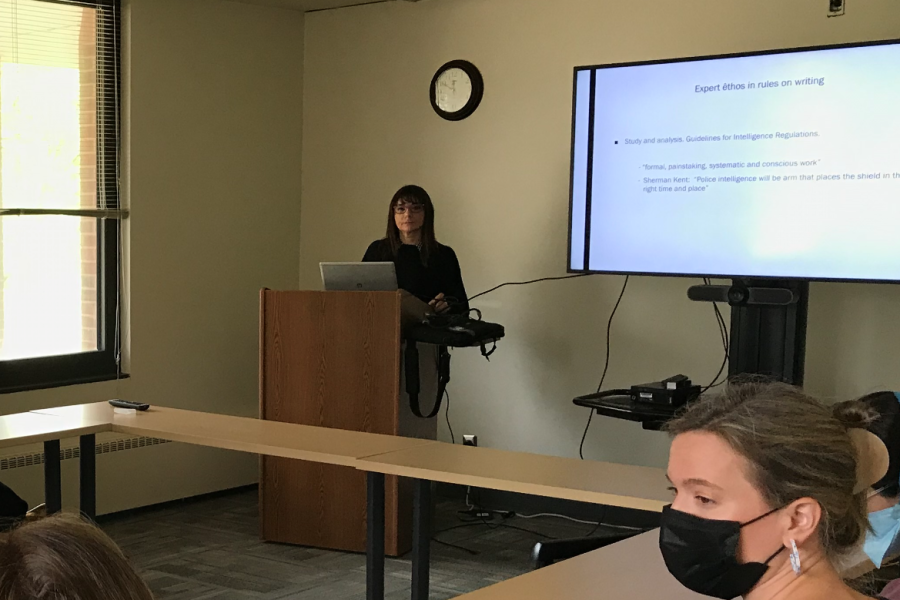Argentinian professor analyzes the rhetoric of dictatorships
Photo courtesy of Alejandra Seufferheld
Dr. Maria Alejandra Vitale, professor and researcher at the University of Buenos Aires, speaks at the Foreign Languages Building as a guest speaker on Friday. Dr. Vitale goes in depth of the Argentina’s Archives of Repression that showcases events in relation to the last military dictatorship in Argentina.
May 23, 2022
On Friday, Dr. Maria Alejandra Vitale, professor and researcher at the Institute of Linguistics at at the University of Buenos Aires, spoke about the application of ethos in Argentina’s Archives of Repression. Vitale was also the president of the Argentinian Rhetoric Association and the Latin American and Rhetoric Association and is now vice president of the Argentinian Society Linguistics.
Vitale is currently leading a research group on the Argentina Archives of Repression — the intelligence reports that detail kidnappings, disappearances, killings and other events that occurred under the last military dictatorship in Argentina.
The Archives of Repression have been declassified in Argentina.
During the presentation, Vitale lectured on how rhetoric, specifically ethos, had an effect on the writing of these documents by intelligence agents, and how that has affected their identity.
Writing norms for these agents were detailed in Vitale’s presentation, which taught intelligent agents how to write these reports with the lack of another rhetorical element: pathos. Agents were told that in writing these intelligence reports, they were taking raw information and manufacturing knowledge, comparing them to professionals.
Get The Daily Illini in your inbox!
The language of these writing norms also compared the DIPBA, the political police of the Buenos Aires province, to a company, relating officers and agents to managers and CEOs, transforming the landscape of work for those who worked for the government under the military dictatorship.
Since agents were encouraged to write without rhetorical pathos and empathy, subjects were dehumanized in these writings, referred to as elements rather than people.
Vitale studies the correlation between the application of ethos in instructing the intelligence agents, changing the way the DIPBA can characterize themselves, as well as the ethos within the intelligence agents’ reports, characterizing the people involved.
“My Ph.D. was about the discourse of writing to legitimize the coup in my country, their military coup,” Vitale said. “In Argentina, there were six military coups in the 20th century. That was my Ph.D. thesis. And then I started to direct the recent group at the University of Buenos Aires.”
Vitale said the Archives of Repression had been researched before but never involved the study of rhetoric.
“I knew the archive, and since that moment, the archive was a study in the field of history, sociology and anthropology — cultural anthropology, but not rhetoric and discourse,” Vitale said. “My group was the first group that studied from the perspective of writing and rhetoric.”
Vitale said that she was happy to be there and receive interest from the public about her field of study.
“I love to create connections and interact between different fields,” Vitale said. “I think that is very important, interdisciplinary.”
Carolyn Fornoff is an assistant professor of Latin American culture and literature at the University, and is currently researching Latin American literature and film.
“I was really interested to learn about the writing strategies that spies and intelligence officers who were collaborating with the Argentine dictatorship used,” Fornoff said.
She also said that she was excited to hear this talk from an expert on the Argentine dictatorship and the Archives of Repression.
“I think it’s interesting to not just study literature when we think about novels or books, but also literary strategies that are used by repressive authoritarian governments,” Fornoff said.






